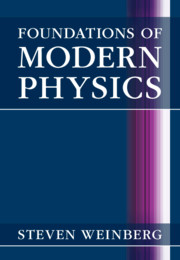7 - Quantum Field Theory
Published online by Cambridge University Press: 22 April 2021
Summary
Chapter 5 described quantum mechanics in the context of particles moving in a potential. This application of quantum mechanics led to great advances in the 1920s and 1930s in our understanding of atoms, molecules, and much else. But, starting around 1930 and increasingly since then, theoretical physicists have become aware of a deeper description of matter, in terms of fields. Just as Einstein and others had much earlier recognized that the energy and momentum of the electromagnetic field is packaged in bundles, the particles later called photons, so also there is an electron field whose energy and momentum is packaged in particles, observed as electrons, and likewise for every other sort of elementary particle. Indeed, in practice this is what we now mean by an elementary particle: it is the quantum of some field that appears as an ingredient in whatever seem to be the fundamental equations of physics at any stage in our progress.
Keywords
Information
- Type
- Chapter
- Information
- Foundations of Modern Physics , pp. 251 - 295Publisher: Cambridge University PressPrint publication year: 2021
